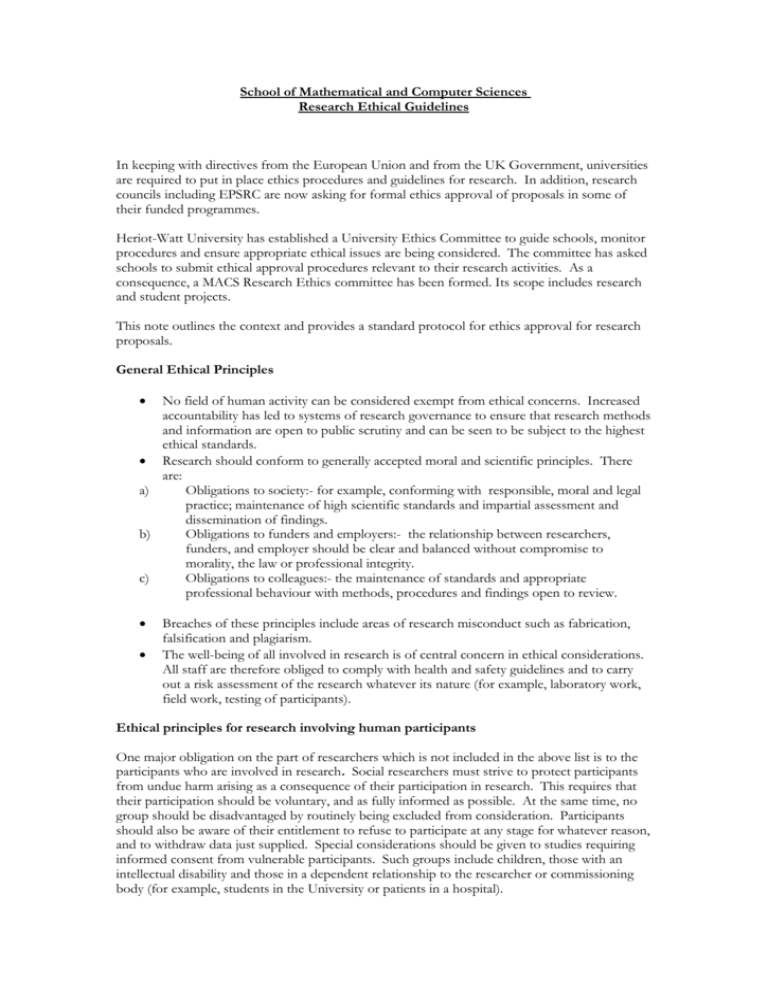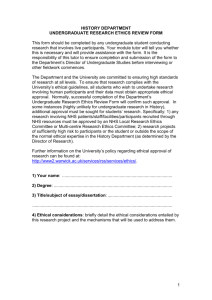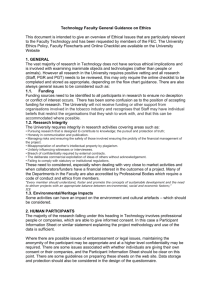Ethics form - Mathematical & Computer Sciences - Heriot
advertisement

School of Mathematical and Computer Sciences Research Ethical Guidelines In keeping with directives from the European Union and from the UK Government, universities are required to put in place ethics procedures and guidelines for research. In addition, research councils including EPSRC are now asking for formal ethics approval of proposals in some of their funded programmes. Heriot-Watt University has established a University Ethics Committee to guide schools, monitor procedures and ensure appropriate ethical issues are being considered. The committee has asked schools to submit ethical approval procedures relevant to their research activities. As a consequence, a MACS Research Ethics committee has been formed. Its scope includes research and student projects. This note outlines the context and provides a standard protocol for ethics approval for research proposals. General Ethical Principles No field of human activity can be considered exempt from ethical concerns. Increased accountability has led to systems of research governance to ensure that research methods and information are open to public scrutiny and can be seen to be subject to the highest ethical standards. Research should conform to generally accepted moral and scientific principles. There are: a) Obligations to society:- for example, conforming with responsible, moral and legal practice; maintenance of high scientific standards and impartial assessment and dissemination of findings. b) Obligations to funders and employers:- the relationship between researchers, funders, and employer should be clear and balanced without compromise to morality, the law or professional integrity. c) Obligations to colleagues:- the maintenance of standards and appropriate professional behaviour with methods, procedures and findings open to review. Breaches of these principles include areas of research misconduct such as fabrication, falsification and plagiarism. The well-being of all involved in research is of central concern in ethical considerations. All staff are therefore obliged to comply with health and safety guidelines and to carry out a risk assessment of the research whatever its nature (for example, laboratory work, field work, testing of participants). Ethical principles for research involving human participants One major obligation on the part of researchers which is not included in the above list is to the participants who are involved in research. Social researchers must strive to protect participants from undue harm arising as a consequence of their participation in research. This requires that their participation should be voluntary, and as fully informed as possible. At the same time, no group should be disadvantaged by routinely being excluded from consideration. Participants should also be aware of their entitlement to refuse to participate at any stage for whatever reason, and to withdraw data just supplied. Special considerations should be given to studies requiring informed consent from vulnerable participants. Such groups include children, those with an intellectual disability and those in a dependent relationship to the researcher or commissioning body (for example, students in the University or patients in a hospital). a) For interviews / focus groups: All participants must be fully informed of the nature of the research and give informed consent prior to interview. Participants must be given a plain language statement of the nature and purpose of the research. It is generally preferable not to identify individual participants but, if the identification of participants is necessary, participants must be informed of this, and of safeguards to ensure that this information is restricted to the researcher or a specific research group. No interview should be recorded without the permission of the participant. Interviews by telephone must meet the same conditions as face-to-face interviews. Written parental consent is required for interviews with participants under age 18 (16 in Scotland), unless such interviews take place in the presence of a parent or guardian or in an institutional setting where the institutional consent has been given. b) Questionnaires: All written questionnaires must have an opening statement informing the participant of the nature and purpose of the research. If a questionnaire contains any questions likely to cause offence to the respondent, this should be clearly indicated on the front cover, so that the participant may decide not to read on. Completion of the forms shall indicate evidence of informed consent. c) Observational methods: Where behaviour patterns are observed without the participants’ knowledge, researchers should take care not to infringe the privacy of an individual or group. Where practical, an attempt should be made to obtain consent post hoc. Cultural variations in what constitutes public and private space should be acknowledged. d) Photography: Photographing human participants in publicly accessible spaces is a legitimate research tool. However; if prejudicial to the participants’ interests or reputation, identifying features of the participant must be obscured. e)Experimental or field testing of participants: Ethical requirements for this situation are the same as for those applying to participant interviews. f) Withholding information from participants: If it is essential to the design of an experiment, questionnaire or interview that some information about its purpose is withheld from participants (e.g. because this knowledge would influence their behaviour), then full information must be provided when participants are debriefed and they must be given the opportunity to withdraw their data. Experiments of this kind should not be conducted if it is likely that participants will react to debriefing with discomfort, anger or objections. More detailed reference documents are available which provide useful further guidance on these issues, notably, the Social Research Association’s Ethical Guidelines, and the BPS ethical code at www.bps.org.uk/documents/Code.pdf. School of Mathematical and Computer Sciences Protocol for Ethics Approval 1. Title of research: 2. Purpose of study: 3. Is ethical approval required by another body linked to the research? If YES please attach copies of the approval given to the other body, and confirmation that no changes have been made to the protocol since approval was granted 4. Is permission required from another body to use data or research materials? If YES please attach copies 5. Does the research involve the use of human subjects: If YES what is the nature of the research e.g. focus group, questionnaire, etc If NO please go to Q.13 N.B. The researcher should have considered the use of secondary data sources and should be clear that the aims of research cannot be met without new primary research involving people. 6. Is written consent to be obtained? If YES please attach a copy of the consent and information form or indicate when it will be supplied. The consent form will be supplied nearer the start of the interviews if project is funded. If NO please justify. 7. How long will a subject have to decide whether to take part in the study. Time in days If less than 1 day, please comment. (Note that it is common in the case of face to face interviews not to give significant advanced notice. This is acceptable in view of maximising the response rates and reliability of some survey based research.) ____________________________________________________________________ ____________________________________________________________________ ____________________________________________________________________ 8. Will any of the subjects be from one of the following vulnerable groups?: Children under 18 (16 in Scotland) Yes People with learning difficulties Yes No Patients in hospital Yes Other vulnerable groups (e.g. mental illness, dementia) Yes No No No 9. If any ‘yes’ box in question 8 is ticked, what special arrangements have been made to deal with issues of consent for the subjects (e.g. consent from parents, professional carer, relevant institution, etc). ____________________________________________________________________ ____________________________________________________________________ ____________________________________________________________________ __________________________________________________________________ 10. Are there any potential physical, psychological or disclosure dangers that can be anticipated from involvement in the research? If yes, please give details. 11. What steps will be taken to safeguard the confidentiality and anonymity of subjects? 12. Does the study design involve actively deceiving participants? If yes, briefly describe the nature of the deception and explain why it is necessary 13. Does the research project comply with the requirements of current Data Protection legislation (for example, data storage and security.), including in relation to the use and (non-) disclosure of secondary data sets? ____________________________________________________________________ _________________________________________________________________ 14. Is your risk assessment of the health and safety implications for staff of the research High/Medium/Low or negligible If medium or high please ensure that the health and safety officer in the school is informed. Please sign the following: I as a Principal Investigator (supervisor) have checked the above for accuracy and am satisfied the information provided is a true reflection of the intended study. Name (please print) ________________________________________ Signature ________________________________________ Date ________________________________________ I am satisfied that the researcher has properly considered the ethical implications of the intended study and has taken appropriate action. _________________________________________________ (Director of Research) Date ________________________________________








